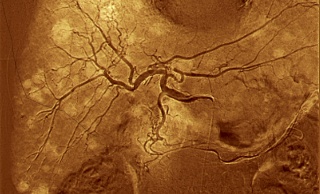

The bispecific HER2-targeted antibody zanidatamab was found to safely induce durable antitumor activity in an expansion cohort of patients with HER2-overexpressing biliary tract cancer (BTC). Data from the phase 1 study’s (ClinicalTrials.gov identifier: NCT02892123) expansion cohort were presented at the 2021 Gastrointestinal Cancers Symposium by Funda Meric Bernstam, MD, chair of the department of investigational cancer therapeutics at The University of Texas MD Anderson Cancer Center in Houston.
Twenty of the 21 patients included in the cohort were available for response, and tumor shrinkage was observed in most of them. The confirmed objective response rate was 40% (95% CI, 19.1-63.9), with 8 patients achieving a partial response. The disease control rate was 65%, and the median duration of response was 7.4 months.
In the dose-escalation part of the phase 1 study, the investigators identified 20 mg/kg of zanidatamab administered every 2 weeks as the recommended dose. This dose was used in the expansion cohort of 21 patients. Tumors were assessed every 8 weeks.
The median patient age was 63 years, and 67% of patients were female. Gallbladder cancer was the most common diagnosis (57%), followed by intrahepatic cholangiocarcinoma (24%) and extrahepatic cholangiocarcinoma (19%). Twenty-four percent of patients received prior HER2-targeted therapy.
Regarding safety, zanidatamab was found to be well-tolerated. No patient experienced a grade 3 or higher drug-related adverse event (AE). One zanidatamab-related serious AE, grade 2 fatigue, was observed in 1 of the trial participants. Two deaths were reported during the study; 1 was due to progressive disease and the other, to an AE not related to zanidatamab therapy.
All patients experienced treatment-emergent adverse events, the most common of which were diarrhea (43%) and infusion-related reactions (33%).
“Based on these results, zanidatamab has the potential to address an unmet needs in patients with HER2-positive biliary tract cancer,” Meric-Bernstam concluded.
more recommended stories
 Texas Medical Board Releases Abortion Training for Physicians
Texas Medical Board Releases Abortion Training for PhysiciansKey Takeaways Texas Medical Board has.
 Safer Allogeneic Stem Cell Transplants with Treg Therapy
Safer Allogeneic Stem Cell Transplants with Treg TherapyA new preclinical study from the.
 Autoimmune Disorders: ADA2 as a Therapeutic Target
Autoimmune Disorders: ADA2 as a Therapeutic TargetAdenosine deaminase 2 (ADA2) has emerged.
 Kaempferol: A Breakthrough in Allergy Management
Kaempferol: A Breakthrough in Allergy ManagementKaempferol, a dietary flavonoid found in.
 Early Milk Cereal Drinks May Spur Infant Weight Gain
Early Milk Cereal Drinks May Spur Infant Weight GainNew research published in Acta Paediatrica.
 TaVNS: A Breakthrough for Chronic Insomnia Treatment
TaVNS: A Breakthrough for Chronic Insomnia TreatmentA recent study conducted by the.
 First-of-Its-Kind Gene-Edited Pig Kidney: Towana’s New Life
First-of-Its-Kind Gene-Edited Pig Kidney: Towana’s New LifeSurgeons at NYU Langone Health have.
 Just-in-Time Training Improves Success & Patient Safety
Just-in-Time Training Improves Success & Patient SafetyA study published in The BMJ.
 ChatGPT Excels in Medical Summaries, Lacks Field-Specific Relevance
ChatGPT Excels in Medical Summaries, Lacks Field-Specific RelevanceIn a recent study published in.
 Study finds automated decision minimizes high-risk medicine combinations in ICU patients
Study finds automated decision minimizes high-risk medicine combinations in ICU patientsA multicenter study coordinated by Amsterdam.

Leave a Comment